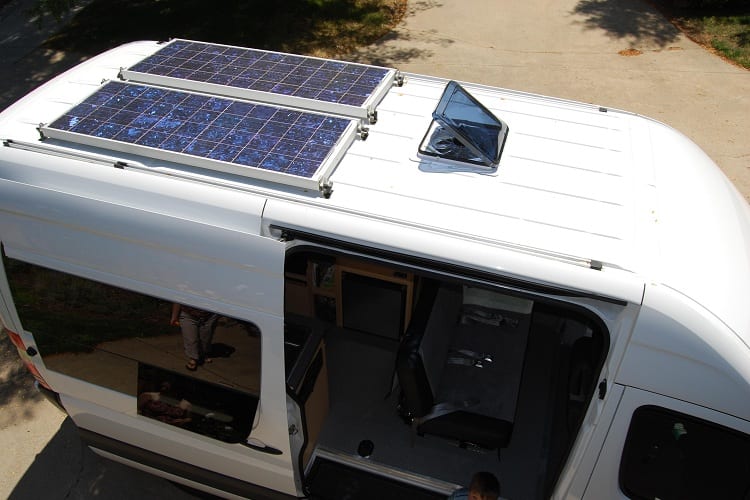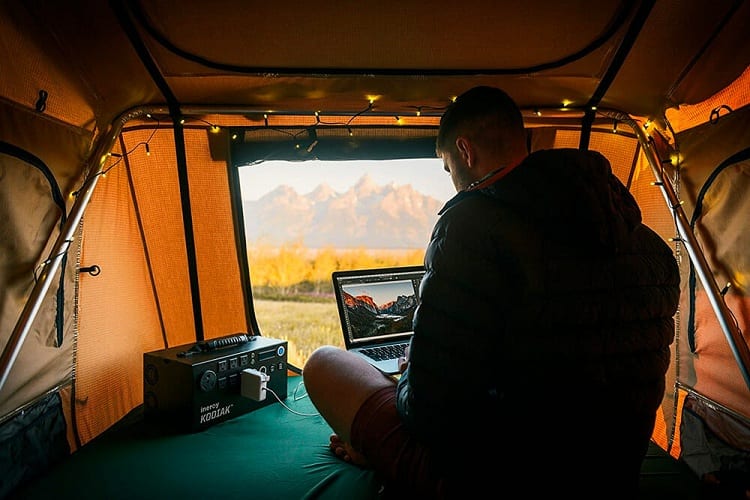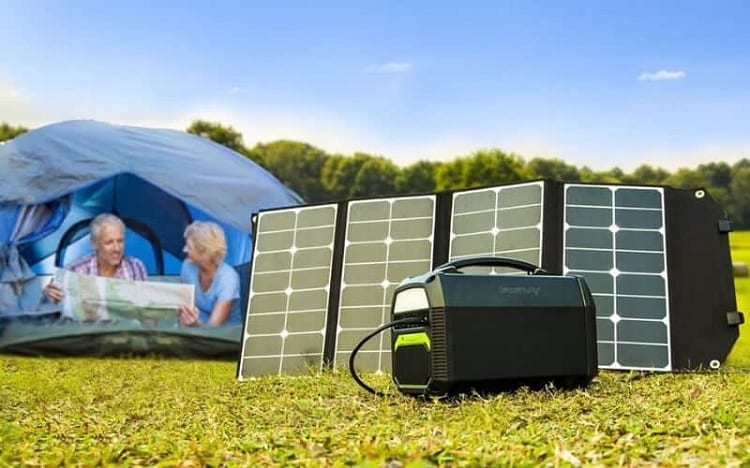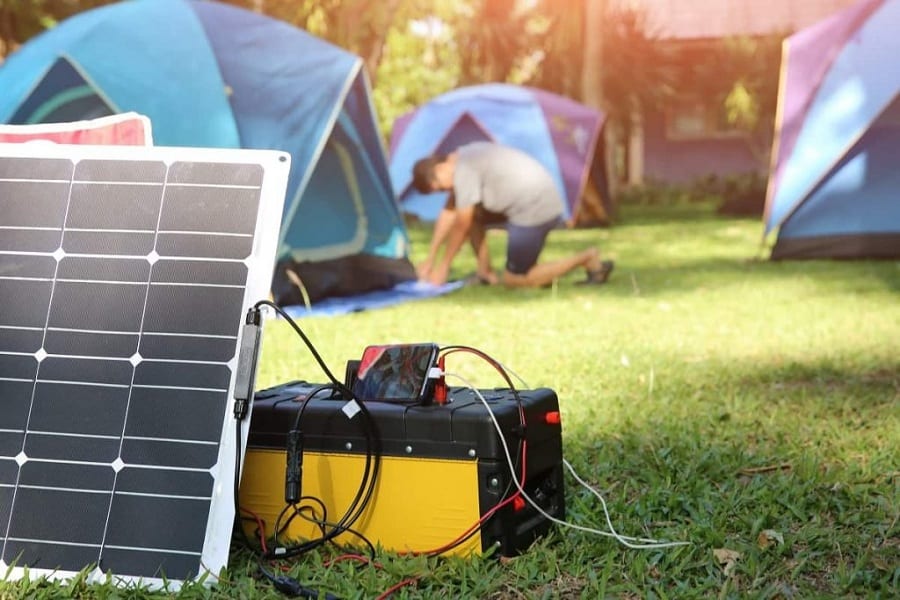Owning an RV is all about ingenuity and coming up with new ways to do things that you’ve never thought of before.
There’s nothing more resourceful than using solar power to keep your RV running and this renewable source of energy is made even easier for campers to harness thanks to the power of solar generators.
How does a solar generator for an RV work? A solar generator features solar panels that capture energy from the sun and then store it in an internal battery so it can be used as AC power.
With one of these generators, you can plug your household appliances and electronics into it to use solar energy without having to rely on fuel, batteries, or electricity to power up.
If you’ve been thinking about alternate methods of powering up your RV, solar is the way to go.
With your own solar generator and a better understanding of how it all works, you’ll be able to harness free and renewable energy directly from the sun, which is ideal for this unique way of portable living.
Contents
Can You Run an RV on Solar Power?

Solar power has come a long way and the methods in which we capture and harness it are now more effective than ever.
If you own an RV, it’s very possible to use solar energy to keep your appliances and electronics running and not have to rely on any other method, so it’s worth looking into.
A solar power generator is one of the easiest ways to do this and takes out a lot of the effort that other methods require.
These generators work by capturing their own solar energy from the sun thanks to carefully placed panels, and then converting them into AC energy so you can use them for your RV.
An RV running on solar is a great way to make the most of your surroundings and harness the natural sunlight, as well as move around the panels as needed to get all of the sunlight you need.
It’s then stored in the generator’s built-in battery to be used as required, and can be used as either your main source of power or a reliable backup option to have on standby.
What to Look For in a Solar Generator

Choosing a solar generator is all about matching one to your RV’s needs, but there are quite a few features to consider.
These are some things you’ll want to keep in mind while looking so that you find the perfect fit.
- DIY or ready-made: A DIY solar generator comprises a generator, solar panels, and inverter, whereas a ready-made one already has all of these parts encompassed in a generator.
- Panels:You’ll want to ensure you have enough solar panels made of efficient materials to help you capture the most of the sun’s energy. These panels usually come in 100-watt ratings, so it will depend on how many you need to keep up with your RV’s energy demands.
- Battery capacity: To determine the best size of the battery, this will require some calculations on your daily energy usage. Think of the minimum wattage requirements you’ll need by looking at the power draw of your most commonly used electronics and appliances, and let this lead you towards a generator with the right battery storage capacity.
- Inverter rating: The inverter rating needs to match the electronics you’re connecting to it, so make sure you choose one that matches the wattages of your devices.
- Portability: As you’ll be taking this generator with you, you’ll need something that can be carried easily and will store in your RV without taking up too much space. Choosing one with portable features like wheels and handles is a good idea for RV usage.
How to Set up a Solar Generator for an RV

Using a solar generator to provide power for your RV is incredibly easy once you’ve found one that meets your requirements.
With the generator ready for action, finding a place to set up the solar panels is the most important step.
You’ll need somewhere with access to direct sunlight, minimal shade and obstructions, and within your view so you can keep an eye on them.
Give the battery time to charge with this solar power and once full, you can connect your devices directly to it using several ports and outlets.
Otherwise, use the stored power just as you would a standard generator, and keep the battery on standby for when emergency power is needed.
Tips and Tricks to Make Solar Work For You

There’s a huge learning curve that comes with switching to solar power but it’s well worth the effort once you get it right.
If you’ve been thinking about investing in a solar generator for your RV, here are some helpful tips that can make it more efficient for you without going through the usual trial and error of renewable energy.
- Location, location, location: Finding the right location for your solar panels will make a world of difference in how much power they create. Keeping them up high on a south-facing RV roof is a smart idea, provided there are no obstructions or shade in the way.
- Reduce your energy usage: Take a look through your RV and think of ways you can reduce your daily energy output. Using solar is a viable option but it’s not always suited for high demand RVs, so think about where you can make changes without losing any of your comforts.
- Keep the fridge cool: Rather than turning the fridge and freezer on and off, store a few large bags of frozen water in there to keep the interior temperature low. This will reduce how often the compressor is turned on which is one of the biggest draws of power in your RV.
- Use solar lights: Lighting can be a drain on electricity, even if you’re using energy-efficient bulbs. While you have the panels out collecting sun during the day, put a few outdoor solar lights there with them. You can use these at night inside of the RV or outside while you’re sitting outdoors, and save the electricity for something else.
- Wind power: Once you get your solar system up and running, think about adding in another renewable energy source from the wind. Wind power is a smart choice for RV owners and is sometimes more efficient than solar, so having both working for you is an efficient option.
- Clean the panels: The solar panels attached to your generator are exposed to a lot of daily contamination. By keeping them clean and wiped down, you’ll ensure they’re getting as much sun as possible, and also prolonging their life so you don’t have to replace them prematurely.
Clean and Green Power For Your RV
The whole world is going green and if you own an RV, there are now more ways than ever that you can as well.
A solar generator is a great investment for your RV and a reliable source of free energy that you can use to keep your creature comforts powered up while you’re on the go.
Related Questions
A solar-powered generator is nothing new in the world of renewable energy but it’s a move that more and more RV owners are starting to make.
If you’re still unsure about using a solar generator for your camper, we’ve answered some common questions that newcomers have that can help you figure out what’s best.
What Size Solar Generator Do I Need?
To determine the size of generator your RV needs, you’ll need to calculate your daily power requirements.
The most basic RV requirements would be a 200-watt solar panel setup with a 4000-watt generator, but this will differ depending on how many people are relying on this power and what type of devices it’s connecting to.
How Long Does Solar Generator Take to Charge?

To fully charge a standard-sized solar generator can take up to 48 hours but this can be impacted by several factors.
The size and materials of the solar panels, the weather conditions, and the capacity of the battery in the generator should all be taken into consideration to get a better estimate of charging time.
Can A Solar Generator Run a Refrigerator?
A solar generator is capable of running a household refrigerator in some cases, provided its battery is at full capacity and it has enough wattage to do so.
For an RV though, you usually won’t require a fridge this size, and it can be an immense drain on power, so consider using a smaller, portable refrigerator for your camping setup.
Resources:


